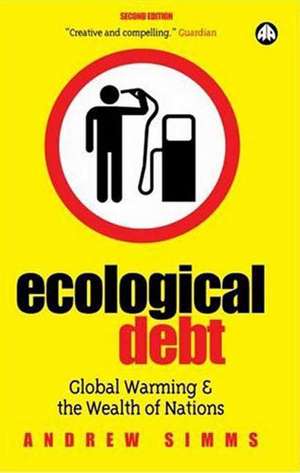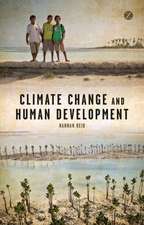Ecological Debt: Global Warming and the Wealth of Nations
Autor Andrew Simmsen Limba Engleză Paperback – 19 feb 2009
Simms shows how millions of us in the West are running up huge ecological debts: from the amount of oil and coal that we burn to heat our houses and run our cars, to what we consume and the waste that we create, the impact of our lifestyles is felt worldwide. Whilst these debts go unpaid, millions more living in poverty in the majority world suffer the burden of paying dubious foreign financial debts.
The book explores a great paradox of our age: how the global wealth gap was built on ecological debts, which the world's poorest are now having to pay for. Highlighting how and why this has happened, he also shows what can be done differently in the future. Now updated throughout, this is a clear and passionate account of the steps we can take to stop pushing the planet to the point of environmental bankruptcy.
Preț: 227.62 lei
Nou
Puncte Express: 341
Preț estimativ în valută:
43.56€ • 45.63$ • 36.10£
43.56€ • 45.63$ • 36.10£
Carte tipărită la comandă
Livrare economică 08-22 aprilie
Preluare comenzi: 021 569.72.76
Specificații
ISBN-13: 9780745327273
ISBN-10: 0745327273
Pagini: 336
Ilustrații: 12 photos, 3 figures
Dimensiuni: 129 x 198 x 20 mm
Greutate: 0.36 kg
Ediția:2 Rev ed.
Editura: PLUTO PRESS
Colecția Pluto Press
ISBN-10: 0745327273
Pagini: 336
Ilustrații: 12 photos, 3 figures
Dimensiuni: 129 x 198 x 20 mm
Greutate: 0.36 kg
Ediția:2 Rev ed.
Editura: PLUTO PRESS
Colecția Pluto Press
Notă biografică
Andrew Simms is policy director of nef (new economics foundation) the award winning independent British think-and-do tank. He went to the London School of Economics, led campaigns for several major aid and development agencies and was one of the original organisers of the Jubilee 2000 debt campaign. He is a regular commentator in the national press and broadcast media, and is on the board of Greenpeace UK and The Energy and Resources Institute (TERI) Europe. Over several years he has written groundbreaking reports on issues ranging from debt, trade, aid, and big business, to biotechnology, and climate change.
Cuprins
Acknowledgements
Preface
1 A Short Walk to Venus
2 The Chemist's Warning: a Short History of Global Warming
3 The Heaven Bursters: Tuvalu and the Fate of Nations
4 The Great Reversal of Human Progress
5 Ecological Debt
6 The Carbon Debt
7 Rationalising Self-destruction (Or Why People Are More Stupid Than Frogs)
8 The Car Park at the End of the World
9 Pay Back Time: the Law, Climate Change and Ecological Debt
10 Data for the Doubtful: the Lessons of War Economies
11 The New Adjustment
12 Minerva's Owl
13 In the Footsteps of Stanley
14 Tick Tock Climate Clock
15 The Duck's Choice
16 How to Live on an Island
Notes
Index
Preface
1 A Short Walk to Venus
2 The Chemist's Warning: a Short History of Global Warming
3 The Heaven Bursters: Tuvalu and the Fate of Nations
4 The Great Reversal of Human Progress
5 Ecological Debt
6 The Carbon Debt
7 Rationalising Self-destruction (Or Why People Are More Stupid Than Frogs)
8 The Car Park at the End of the World
9 Pay Back Time: the Law, Climate Change and Ecological Debt
10 Data for the Doubtful: the Lessons of War Economies
11 The New Adjustment
12 Minerva's Owl
13 In the Footsteps of Stanley
14 Tick Tock Climate Clock
15 The Duck's Choice
16 How to Live on an Island
Notes
Index










